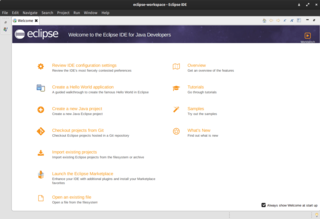
An integrated development environment (IDE) is a software application that provides comprehensive facilities to computer programmers for software development. An IDE normally consists of at least a source code editor, build automation tools and a debugger. Some IDEs, such as NetBeans and Eclipse, contain the necessary compiler, interpreter, or both; others, such as SharpDevelop and Lazarus, do not.

Eclipse is an integrated development environment (IDE) used in computer programming. It contains a base workspace and an extensible plug-in system for customizing the environment. Eclipse is written mostly in Java and its primary use is for developing Java applications, but it may also be used to develop applications in other programming languages via plug-ins, including Ada, ABAP, C, C++, C#, Clojure, COBOL, D, Erlang, Fortran, Groovy, Haskell, JavaScript, Julia, Lasso, Lua, NATURAL, Perl, PHP, Prolog, Python, R, Ruby, Rust, Scala, and Scheme. It can also be used to develop documents with LaTeX and packages for the software Mathematica. Development environments include the Eclipse Java development tools (JDT) for Java and Scala, Eclipse CDT for C/C++, and Eclipse PDT for PHP, among others.

IntelliJ IDEA is an integrated development environment (IDE) written in Java for developing computer software. It is developed by JetBrains, and is available as an Apache 2 Licensed community edition, and in a proprietary commercial edition. Both can be used for commercial development.

Django is a Python-based free and open-source web framework that follows the model-template-views (MTV) architectural pattern. It is maintained by the Django Software Foundation (DSF), an American independent organization established as a 501(c)(3) non-profit.
RadRails is a Rapid Application Development IDE for the Ruby on Rails framework. The goal of RadRails is to provide Ruby on Rails developers with everything they need to develop, manage, test and deploy their applications. Features include source control, code assist, refactoring, debugging, WEBrick servers, generator wizards, syntax highlighting, data tools, and much more.

Komodo Edit is a free and open source text editor for dynamic programming languages. It was introduced in January 2007 to complement ActiveState's commercial Komodo IDE. As of version 4.3, Komodo Edit is built atop the Open Komodo project.

Aptana, Inc. is a company that makes web application development tools for use with a variety of programming languages. Aptana's main products include Aptana Studio, Aptana Cloud and Aptana Jaxer.
The following tables list notable software packages that are nominal IDEs; standalone tools such as source code editors and GUI builders are not included. These IDEs are listed in alphabetical order of the supported language.
Web2py is an open-source web application framework written in the Python programming language. Web2py allows web developers to program dynamic web content using Python. Web2py is designed to help reduce tedious web development tasks, such as developing web forms from scratch, although a web developer may build a form from scratch if required.
The Wing Python IDE family of integrated development environments (IDEs) from Wingware was created specifically for the Python programming language. These lightweight but full-featured Python IDEs are designed to speed up writing, debugging, and testing code, to reduce the incidence of coding errors, and to make it easier to understand and navigate Python code.

PyScripter is a free and open-source software Python integrated development environment (IDE) for Windows. It is built in Object Pascal and Python.

PyCharm is an integrated development environment (IDE) used in computer programming, specifically for the Python language. It is developed by the Czech company JetBrains. It provides code analysis, a graphical debugger, an integrated unit tester, integration with version control systems (VCSes), and supports web development with Django as well as Data Science with Anaconda.
PythonAnywhere is an online integrated development environment (IDE) and web hosting service based on the Python programming language. Founded by Giles Thomas and Robert Smithson in 2012, it provides in-browser access to server-based Python and Bash command-line interfaces, along with a code editor with syntax highlighting. Program files can be transferred to and from the service using the user's browser. Web applications hosted by the service can be written using any WSGI-based application framework.
JetBrains s.r.o. is a Czech software development company whose tools are targeted towards software developers and project managers. As of 2019, the company has over 990 employees in its offices in Prague, Saint Petersburg, Moscow, Munich, Boston, Novosibirsk, Amsterdam, Foster City and Marlton, New Jersey.

Architect is an open-source integrated development environment (IDE), based on Eclipse. It serves as a multi-purpose workbench for data scientists, by providing support for various programming languages and technologies.









